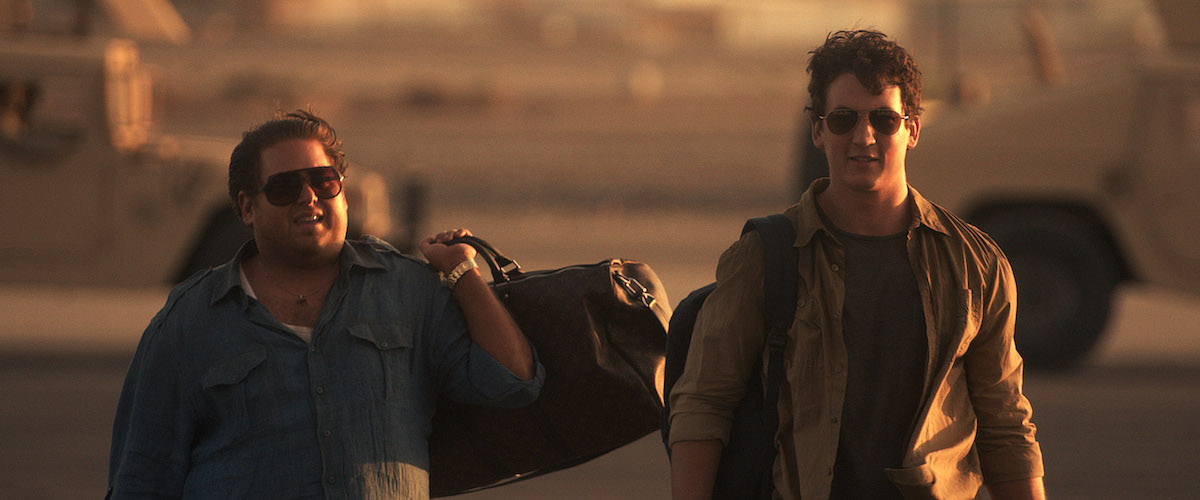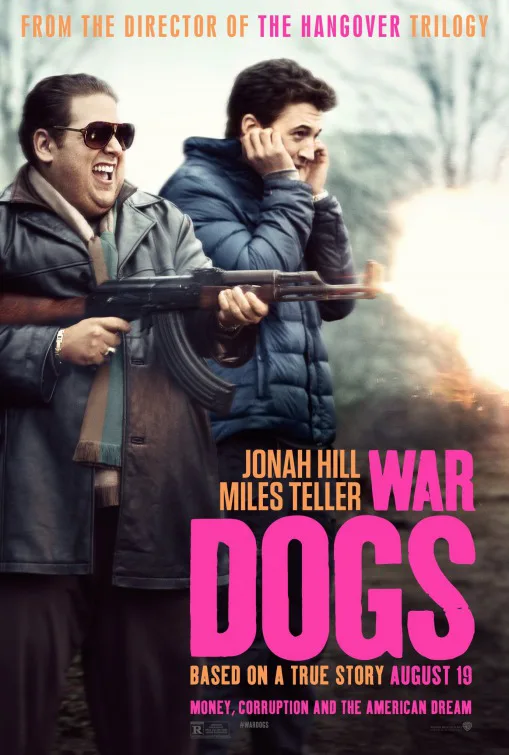“War Dogs” is a film about horrible people that refuses to own the horribleness. It’s too enamored with its glib arms dealer heroes, and although it’s packed with scenes that might have inspired moral whiplash in works like “Scarface,” “Goodfellas” and “The Wolf of Wall Street“—to name three superb films about guys who get equally high on drugs and the adrenaline rush of living outside the law, and that “War Dogs” references constantly—they’re always softened by Hollywood special pleading: Aren’t these guys adorable and funny? Don’t you love what good friends they are? Don’t you admire their audacity? Look at how troubled the hero seems—don’t you feel for him?
Director and co-writer Todd Phillips (the “Hangover” trilogy) would seem to be an ideal, or at least promising, person to tell this tale of a couple of pipsqueak Miami arms dealers who make a fortune providing guns and bullets to the US military during the height of the Bush administration’s wars in Iraq and Afghanistan. But “War Dogs,” which is based on a Rolling Stone article and a subsequent book by Guy Lawson, lacks the courage of its convictions. Tone-wise, it’s all over the map. Sometimes it seems to stare pitilessly at its hero and narrator, former massage therapist and bed sheet dealer turned arms trafficker David Packouz (Miles Teller), and his friend and boss Efraim Diveroli (Jonah Hill), and recognize them as greedy, expedient men who only care about fattening their bank accounts. But other times it seems inordinately concerned with whether David and Efraim will stay pals once things turn south—as if it’s a straightforward, un-ironic buddy flick about badass dudes doing badass things, sometimes in slow-motion, instead of a twisted and conflicted parody of that kind of film.
Worse, “War Dogs” presents David’s barely-developed wife Iz (Ana de Armas) as a voice of conscience who’s horrified by her husband’s lies and furtiveness, never anything more. Whenever the movie concentrates on Iz and David’s marriage problems, it confirms its softness. Every time it asks us to care deeply about whether David will lose Iz—who chastises David for his dishonesty, then supports him, then turns against him again, always according to the needs of the plot at that moment—it exposes its sweet-creamy Hollywood center. Henry and Karen Hill these two ain’t.
Scorsese’s “Wolf of Wall Street,” which costarred Jonah Hill, drew critical fire (like “Goodfellas” and “Scarface” before it) for making its wheeler-dealer protagonists as fun to watch as they were morally repulsive; but that was part of the movie’s design, and whether you thought Scorsese and writer Terence Winter succeeded or failed, it was obvious that you were supposed to feel torn about the characters and question if you should be having fun watching them get over. It was a variation on the gangster film attraction-repulsion strategy, where you share the hero’s power trip fantasy and then feel the sting of reality slapping him in the face. “War Dogs” keeps the Scorsesean arrogant-macho banter (which can be very funny, thanks to the relaxed interplay between Hill and Teller) but it loses the ugly undertow that makes non-sociopathic viewers feel slightly dirty for feeling so excited. The detailed breakdowns of the fine points of arms deals come across as a guns-and-ammo version of hedge fund guys bragging about a haul.
The choice of storyteller is a big part of the film’s problem. David, whose real-life equivalent served as a technical advisor and has a cameo, is depicted as nearly as big of a blank as his poor wife. He’s a nice guy who was just going about his business when Satan showed up in the form of Efraim, rather than a quick study who ditched his two day jobs and within a matter of weeks was able to manage a soon-to-be-multimillion dollar business built on Beretta pistols and AK-47 shells bought on the cheap and shipped into war zones.
The best thing about “War Dogs” is the characterization of Efraim, as embodied by Hill. This actor portrays blobby, sarcastic, volatile men better than anyone since the late, great Chris Penn, and he’s terrific here, using the character’s squeaky laugh as an exclamation point at the end of a tense moment, and letting us see the calculations happening in Efraim’s reptilian brain by letting his eyes go cloudy. There are moments where you can spot the exact moment when Efraim decides to betray or destroy someone; often the moment occurs when Efraim is insisting that he’s all about loyalty and trust. If “War Dogs” had put Efraim at its center, it might have gotten closer to its apparent wish to be a scathing, Scorsesean take on arms dealing during the War on Terror—half madcap comedy, half expose. At the very least, it would have inoculated itself against claims that it’s a safe film on a dangerous subject. Efraim is a slobbish but confident con artist who trudges through life in baggy leisure wear and expensive sunglasses, puffing up his ego with money and guns and telling David, “I’m not pro-war. The war is happening. This [business] is pro-money.” At one point he even describes himself to an Iraqi as an “ugly American,” frankly claiming a stereotype that he knows he embodies from head to toe.
You get the sense that Efraim knows full well what he is but has decided not to worry about it, a scenario that’s considerably more chilling than all the scenes of David worrying that Efraim has gone too far but is too good a friend to abandon. Every time Efraim appears onscreen, the audience and the movie have to reckon with him. But “War Dogs” chooses instead to hang on David and take his exculpatory narration at face value, as if both Phillips and the audience are as gullible as Iz.
Phillips knowingly cites “Goodfellas” through various formal techniques (chatty narration, scary-funny violence, freeze-frames) to the point where you pretty much have to buy the idea that David is a twenty-something, 21st century Henry Hill. But “War Dogs” doesn’t have the bravura visuals and electrifying coldness of Scorsese in gangster-scumbag mode. And you never get the sense, as you do in the best narrated Scorsese films, that the narrator is shading things to make himself seem more glamorous, or less culpable in horror than he actually was (as exemplified in the “Goodfellas” scene where Hill calmly describes the ramifications of a mob footsoldier killing a waiter on a whim, but the movie shows us closeups of the character looking appalled and distressed).
“War Dogs,” in contrast, wants us to take David at face value, as a nice guy who made a few mistakes and got in way over his head before coming to his senses but is still basically decent. In the end, he comes off as guilty mainly of loving and trusting his friend, and there’s hardly anything in the film to suggest that this might not be the whole story. Efraim, meanwhile, comes across as more of an outrageous, hot-tempered clown than a grubby visionary pig whose lack of education and refinement are eclipsed by a predator’s cunning. The film turns him into glorified comic relief, so funny that he can’t be properly frightening. Most of the characters in the first “Hangover” seemed more disreputable and unpredictable than this guy, and Phillips seemed not to care if we liked them as long as we found them funny and interesting; here he wants us to like his slimy people, too—or at least the film wants us to like David, and root for him to stay friends with Efraim and win back Iz’s love. It’s a brief in David’s defense that sometimes plays as if it was written by David himself.




















